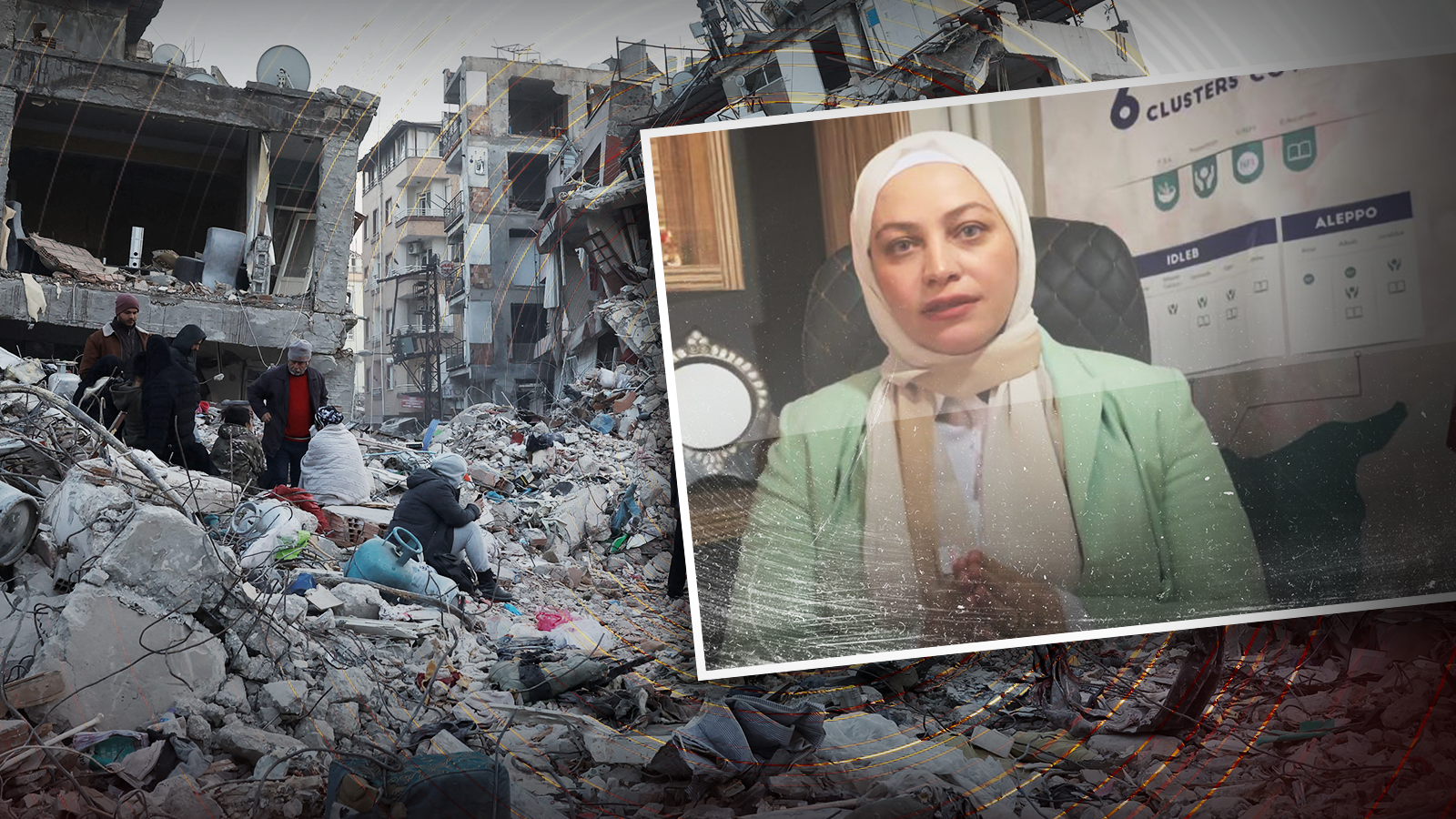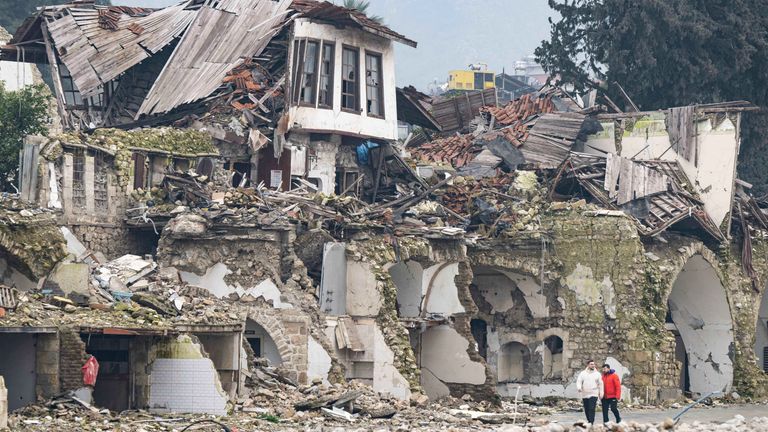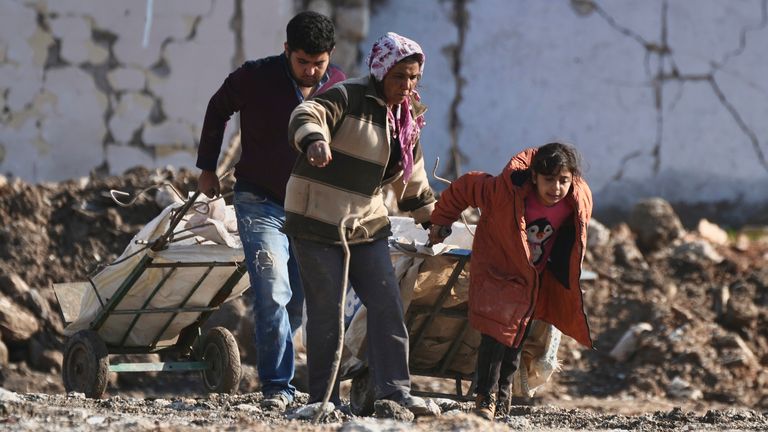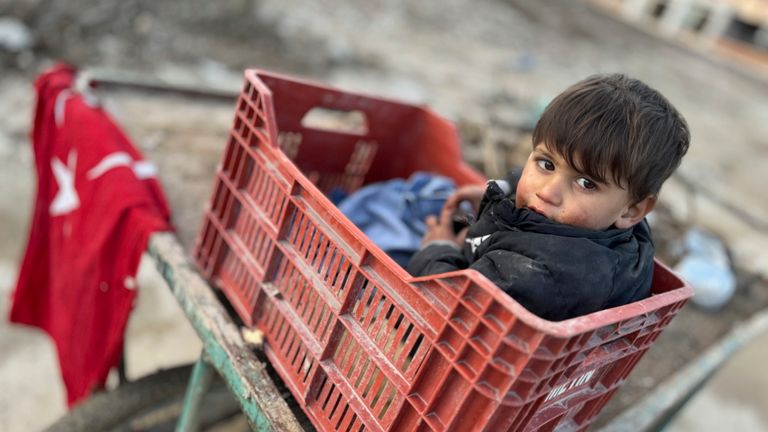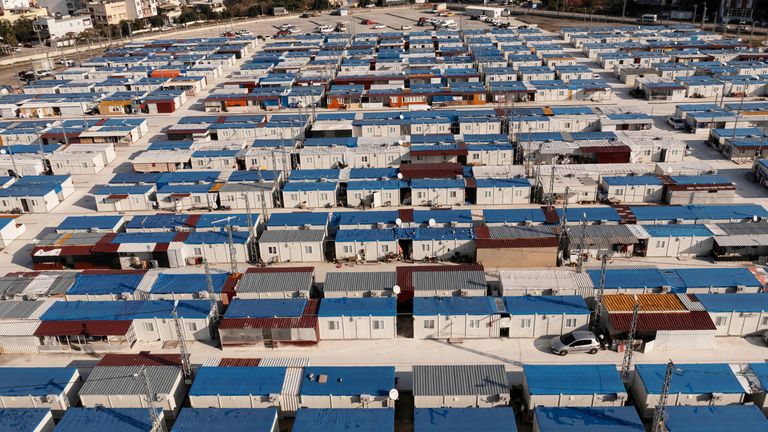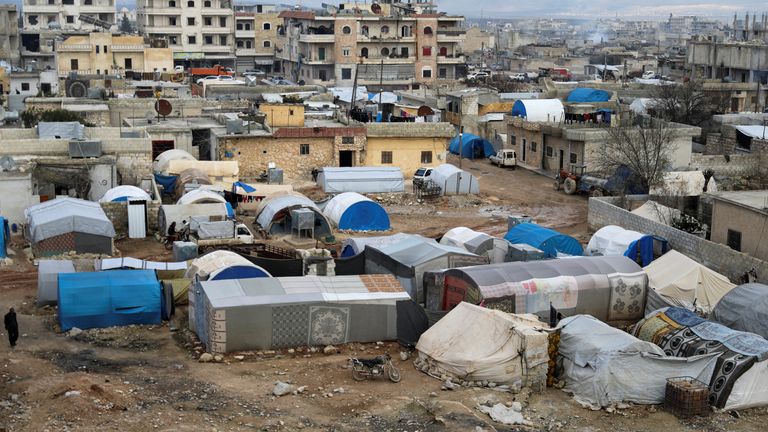“I will never be able to forget what happened – I can still feel the earth shaking,” says Rana Bitar, her voice catching in her throat.
The charity boss says she lost 72 members of her extended family in the devastating earthquake that struck Turkey and Syria last year.
“I felt terror, fear and worry,” she tells Sky News, appearing close to tears as she recalls the moment the 7.8-magnitude quake hit the region, killing tens of thousands of people.
“At first, I did not know what was happening. I thought it was a war, that we were being bombed. I heard the sounds of explosions.”
At the time, Ms Bitar was alone at home with her two-and-a-half-year-old son in Gaziantep in Turkey, close to the epicentre.
As her flat shook, she picked up the toddler and rushed down seven flights of stairs and out into the “extremely cold weather” and snow. They were dressed in pyjamas and Ms Bitar was walking barefoot.
“It was horrible,” she says. “I was only thinking about my child, my parents, my family members.
“I recalled my whole life. I called my mother in Belgium and told her: ‘If something happens to me, I just wanted to say goodbye.'”
Ms Bitar, her husband and their son spent the next eight days living in their car and a nearby mosque.
At first, they did not know what had happened or how much death and destruction the earthquake had caused.
After learning the extent of the disaster on the news and discovering she had lost family, friends and colleagues, Ms Bitar says she had a nervous breakdown.
The 72 members of her extended family who died were related to her from her father’s side, she says. They had fled together from Latakia in Syria to Hatay in Turkey, which was the hardest-hit province.
Whole families were wiped out, including Ms Bitar’s uncle and aunt and their children and grandchildren, she says. The youngest relative to die was five, while the oldest was 79.
“Losing so many loved ones and relatives was very sad and painful. I cried a lot,” she says. “I cannot explain the fear I have felt since the day of the earthquake.
“A few days ago I was having lunch with my husband and he started shaking his leg – I was terrified and asked him whether another earthquake was happening.”
Hidden health problems
More than a year since the earthquake struck on 6 February 2023, many survivors are struggling with the trauma of losing loved ones and suffering from hidden health problems.
The earthquake killed more than 50,000 people in Turkey and some 5,900 people in Syria, while leaving millions homeless.
As well as physical injuries sustained in the disaster, survivors have suffered psychological problems, including insomnia and eating disorders, according to Madara Hettiarachchi, director of programmes at the Disasters Emergency Committee (DEC).
She says there was a noticeable increase in psychological issues as the anniversary approached, telling Sky News: “The aftershocks don’t help and being cloistered in container camps is a double whammy.”
Many survivors found themselves breaking down into tears, Ms Hettiarachchi says, adding: “There was a lot of crying, a lot of feeling fragile.
“Some people thought they had moved on. One woman said, ‘I thought I was strong, I thought I was coping okay, but I feel really emotional and like it’s going backwards’.”
‘Easy for diseases to spread’
More than three million people were displaced by the earthquake, which flattened towns and caused widespread destruction in cities, leaving many who lost their homes living in temporary accommodation while struggling to find new places to live.
The DEC says some 787,000 people are still living in shelters, flimsy tents and so-called container cities in Turkey, as of December last year, where they are at greater risk of respiratory illnesses and seasonal flu, as well as scabies, lice and cholera.
“They’re small crowded spaces with very limited water and sanitation, so it’s easy for diseases to spread,” warns Ms Hettiarachchi. She says aid agencies have been focused on promoting hygiene and offering disaster relief such as hygiene kits, which include bathing soap, laundry soap, toothbrushes and sanitary pads.
Some 15 million people in Syria were already in need of humanitarian assistance before the disaster struck, with damage to pipes and water tanks increasing the risk of waterborne diseases such as cholera and dysentery.
Several relief workers say there has been an increase in miscarriages and early births after the earthquake, while some mothers had trouble breastfeeding.
“Earthquakes and other disasters have a profound impact on the stress levels not only within communities but particularly among pregnant women,” Ozlem Kudret Cokmez, a sexual and reproductive health counsellor at Doctors Of The World Turkey, tells Sky News.
“Pregnancy and childbirth, already stress-inducing on their own, become even more challenging when coupled with factors like the degree of exposure to earthquakes, the loss of relatives, family breakdown, or relocation to new environments.”
Click to subscribe to the Sky News Daily wherever you get your podcasts
Rise in gender-based violence
Ms Cokmez says there have been increases in gender-based violence, including domestic abuse and sexual assault, as well as early marriages and child labour, amid unemployment, limited access to basic needs, mental health issues and trauma.
In response to such risks, charities like Space Of Peace – the organisation led by Ms Bitar – have been offering safe spaces and psychological and social support to women, as well as offering workshops for them to learn English and other skills to help them find jobs amid the worsening economic situation.
Read more:
Ex-Premier League footballer found dead under rubble
Anger over building standards in wake of deadly earthquake
Syrian refugees – having fled nearly 13 years of civil war to Turkey – saw the earthquake heap further misery upon their plight. “These people lost their homes many times,” Ms Bitar says. “First when they went from Syria to Turkey, then again after the earthquake. They are struggling on so many levels.”
As well as the psychological damage of the disaster, around 70% of the 118,000 people injured in the earthquake have long-term rehabilitation issues, according to the World Health Organisation. In response, charities have been providing physical therapy, wheelchairs and crutches.
Turkey’s President Recep Tayyip Erdogan has pledged to provide 200,000 homes across the area affected by the earthquake by the end of the year.
Ms Hettiarachchi believes there is some cause for optimism, saying: “Hearing stories both from aid workers as well as people who have benefited from humanitarian assistance, there is some sort of relief, there is progress.”
But she adds: “It’s worth remembering the scale of it. Any response, either by the government or by humanitarian agencies, pales by comparison. It just feels like we’re scratching the surface.”
